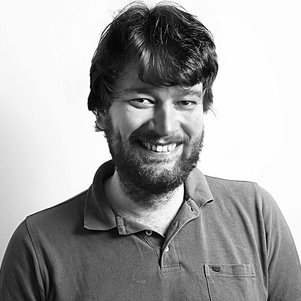Navigating the Uncharted Waters of Fluid Mechanics
A Vidi grant for Manuel Gnann
Fluid mechanics, the scientific study of how liquids move and interact, plays an indispensable role in advancing our scientific understanding of the world around us. It is part of the bedrock upon which many areas of science, from physics and engineering to medicine and even ecology, are built. As it stands, science has already deciphered much of its intricate landscape. Yet, many open problems continue to be a frontier of uncharted knowledge, part of which Manuel Gnann’s Vidi research aims to explore.
The crux of a remaining puzzle in fluid mechanics lies in the phenomenon known as the 'moving contact line' problem. This problem pertains to the exact point where a liquid, solid, and gas (or two liquids and a solid) coalesce. This point is called a 'triple junction', and is home to 'singularities': instances where the equations that govern fluid motion become unusually complex or undefined. Despite being a long-standing challenge in physics and mathematics, these singularities are still poorly understood. With a better mathematical understanding of these singularities, Gnann hopes to contribute to computational models that further advance applied physics or engineering.
The research in question takes an innovative approach to this problem by utilizing partial differential equations (PDEs), mathematical tools that describe a myriad of physical phenomena. Through the rigorous analysis of these PDEs, we can shed light on complex scenarios where fluid motion is paramount, such as the interaction of water droplets with the surface of a leaf. While PDEs have allowed us to model complex scenarios like a boundless ocean with a free surface or a falling droplet, they also hint at the presence of the aforementioned singularities when such surfaces have endpoints. This project seeks to tackle this final piece of the puzzle by developing a robust mathematical framework to handle these singularities.
Gnann’s research is part of a larger initiative at the Delft Institute of Applied Mathematics (DIAM), focussed at using partial differential equations (PDEs) to develop innovative tools for applied mathematics. This kind of mathematical research, though deeply fundamental in its nature, has profound implications for our real-world understanding and problem-solving capabilities. For example, by resolving a longstanding unknown in interface motion in fluid mechanics, we could unlock new efficiencies in industries such as manufacturing or chemical processing, advance our capabilities in medical treatments that rely on understanding fluid motion, or even deepen our knowledge of the ecological processes that help our planet thrive.
The Dutch NWO Vidi grant, part of the Netherlands Organisation for Scientific Research's (NWO) Innovational Research Incentives Scheme, is a prestigious award for experienced researchers. Designed to stimulate innovative research in the Netherlands, it supports recipients with up to 800,000 euros to develop their research themes, establish or grow a research group, and conduct research of their choice over five years. Besides financial support, the grant acknowledges a researcher's scientific excellence and potential, thereby facilitating career advancement and significant contributions to their fields.

